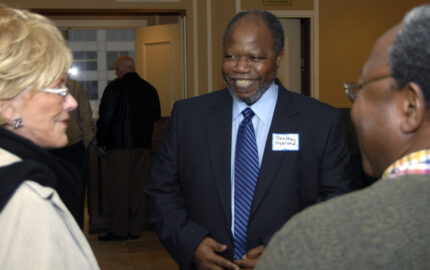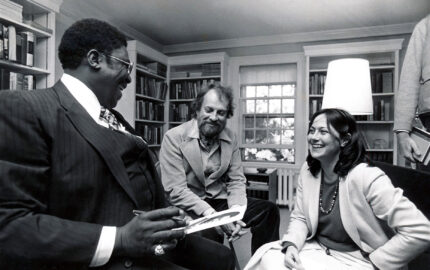1946
 Robert Manning, an influential editor of The Atlantic Monthly, died of lymphoma at a hospital in Boston on September 28th. He was 92.
Robert Manning, an influential editor of The Atlantic Monthly, died of lymphoma at a hospital in Boston on September 28th. He was 92.Manning was editor in chief of the magazine, now called The Atlantic, from 1966 to 1980, a period during which its circulation grew from 200,000 to 335,000. He hired or helped further the careers of several major writers, including James Fallows, Elizabeth Drew, Ward Just, Ross Terrill, Tracy Kidder, and Dan Wakefield.
"Bob Manning was a very graceful writer and a talented editor, a proud and witty man, a gregarious and devoted and big-hearted friend," Fallows wrote in a remembrance on The Atlantic's website. "During his nearly 15 years as The Atlantic's editor, he brought the magazine into the center of covering the big events of that time, notably the Vietnam war, civil rights progress … and much else."
Manning's tenure ended in controversy after real estate developer Mortimer Zuckerman bought the magazine at Manning's urging. Zuckerman went behind Manning's back, "bounding about like a wallaby in heat in search of a new editor in chief," as Manning put it in his 1992 memoir, "The Swamp Root Chronicle: Adventures in the Word Trade." Manning resigned at the end of 1980.
Born and raised in Binghamton, New York, Manning worked at the Binghamton Press while in high school and was quickly promoted to reporter. He later worked in The Associated Press's Buffalo bureau, then spent a year in the Army before joining the United Press in Washington and New York. In 1949 he was hired by Time magazine. He served as London bureau chief before he left in 1961 to become Sunday editor of The New York Herald Tribune.
He also served as assistant secretary of state for public affairs in President John F. Kennedy's administration before becoming executive editor at The Atlantic Monthly. He was named the 10th editor in chief in 1966. After leaving the magazine in 1980, he became part owner of the Boston Publishing Company, overseeing its successful 25-volume series "The Vietnam Experience."
His first wife, Margaret, died in 1984. He is survived by his second wife, Theresa, two sons, and four grandchildren. Another son died in 2004.
1954
 Richard Dudman retired from the Bangor Daily News in June, ending his career in newspapers. Dudman is best known for his decades at the St. Louis Post-Dispatch during which he served as Washington correspondent and bureau chief and reported from Vietnam, Cambodia and other countries. During the U.S. incursion into Cambodia in 1970, Dudman and two other reporters were ambushed while traveling to Phnom Penh and held captive for more than a month by guerrillas. He wrote about the ordeal in his book "40 Days With the Enemy," published in 1971, making good on the pep talk he gave his fellow captives: "If we get out of this alive, we'll have one hell of a story."
Richard Dudman retired from the Bangor Daily News in June, ending his career in newspapers. Dudman is best known for his decades at the St. Louis Post-Dispatch during which he served as Washington correspondent and bureau chief and reported from Vietnam, Cambodia and other countries. During the U.S. incursion into Cambodia in 1970, Dudman and two other reporters were ambushed while traveling to Phnom Penh and held captive for more than a month by guerrillas. He wrote about the ordeal in his book "40 Days With the Enemy," published in 1971, making good on the pep talk he gave his fellow captives: "If we get out of this alive, we'll have one hell of a story."As a student at Stanford University, he worked on the campus newspaper during the school year and for the Oroville (Calif.) Mercury Register, where his uncle was the editor and publisher, during summers. After serving in the Naval Reserve (now the Navy Reserve) during World War II, he spent four years working for The Denver Post before moving to the Dispatch in 1949, where he remained on staff until 1981. Dudman continued to write for the paper on special occasions, including his 1993 trip to Vietnam to interview the general who had captured him in Cambodia.
For the past 12 years he was senior contributing editor at the Bangor Daily News.
1955
 William French, who for 30 years was one of Canada's most prominent literary critics, died in Toronto on July 24th. He was 86.
William French, who for 30 years was one of Canada's most prominent literary critics, died in Toronto on July 24th. He was 86.French spent his entire 42-year career at The Globe and Mail in Toronto, where he was hired out of college in 1948. In 1960, he was appointed literary editor and began writing three columns a week, along with features, reviews and other commentary, during a formative time for Canadian literature.
"He was the go-to guy in criticism in Canada," said former Globe and Mail editor Edwin O'Dacre in the paper's obituary. "He was the only legitimate voice. He was looked up to, and he had the presence that would allow you to look up to him."
During his tenure, he introduced a number of new voices to Canadian readers, including Sandra Birdsell, Nino Ricci, and Neil Bissoondath, and he helped bolster the careers of writers such as Alice Munro, Margaret Atwood, Robertson Davies, and Michael Ondaatje.
"He knew he had the best job at the paper," Paul French said of his father. "It was all he ever wanted to do."
At the time that French was literary editor, reviews played an important role in a book's success. "His review was very important," said former Penguin Canada publisher Cynthia Good. "It was the review of record."
He received the National Newspaper Award in 1971 and 1978 for his columns opposing censorship.
French enjoyed a quiet life in the suburbs of Toronto with his wife of 61 years, Jean. According to their son Paul, the house they had lived in since 1956 contained about 8,000 books, and French was known to read everywhere, including the bathtub.
French, who retired in 1990, was The Globe and Mail's last full-time book critic. "They retired his number," Paul told the paper.
In addition to his wife and son Paul, he is survived by another son, two daughters, and four grandchildren.
1964
 Clarence Jones self-published a memoir, "They're Gonna Murder You: War Stories From My Life at the News Front," in August.
Clarence Jones self-published a memoir, "They're Gonna Murder You: War Stories From My Life at the News Front," in August.The book's title refers to Jones's career-long habit of investigating mobsters, crooked cops, corrupt politicians, and other powerful people known for retaliation. At The Miami Herald, he worked on a major investigation of the sheriff's office. Later, as a TV reporter in Louisville, Kentucky, he went undercover to investigate illegal gambling, using hidden cameras and microphones. His work has earned him four Emmys and three DuPont awards.
Jones, who runs the media relations firm Winning News Media, Inc., is also the author of "Winning With the News Media."
1966
 Bob Giles will receive a 2012 Yankee Quill Award from the Academy of New England Journalists at the annual meeting of the New England Society of Newspaper Editors in November.
Bob Giles will receive a 2012 Yankee Quill Award from the Academy of New England Journalists at the annual meeting of the New England Society of Newspaper Editors in November.Giles is being recognized for his 11-year tenure as curator of the Nieman Foundation, especially his outreach efforts with the Nieman Journalism Lab, Nieman Watchdog Project, and the various narrative programs, as well as his role as publisher of Nieman Reports. The selection committee included previous Yankee Quill winners and members of New England journalism organizations.
1968
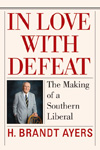 H. Brandt Ayers's memoir "In Love With Defeat: The Making of a Southern Liberal" is being published this fall by NewSouth Books.
H. Brandt Ayers's memoir "In Love With Defeat: The Making of a Southern Liberal" is being published this fall by NewSouth Books.Ayers, the publisher of The Anniston (Ala.) Star and chairman of Consolidated Publishing Co., got his start as a reporter in North Carolina and Washington, D.C. during the early days of the civil rights movement. He later had an up-close view of the birth of the New South as editor of the Star, his family's paper.
Summing up his own career and the narrative of the memoir, Ayers writes: "The journey was one of controversy, danger, a racist nightrider murder, taut moments when the community teetered on the edge of mob violence that ended well because of courageous civic leadership and wise hearts of black and white leaders. The narrative has outsized figures from U.S. Attorney General Robert Kennedy to George Wallace and includes probing insights into the Alabama governor as he evolved over time."
The chapter about Ayers's Nieman year is called "Escape From the South."
1980
 Paul Lieberman's new book, "Gangster Squad: Covert Cops, the Mob, and the Battle for Los Angeles," was published by St. Martin's in August.
Paul Lieberman's new book, "Gangster Squad: Covert Cops, the Mob, and the Battle for Los Angeles," was published by St. Martin's in August.It expands on a seven-part series that Lieberman wrote for the Los Angeles Times in 2008 about a secretive police unit that fought organized crime in Los Angeles after World War II. The book focuses on two detectives—the upstanding Sergeant Jack O'Mara and the cynical Sergeant Jerry Wooters—and their not-always-legal efforts to stop Mickey Cohen, the city's most notorious gangster.
The series not only led to a book contract but it also inspired a Hollywood film of the same name. Set to be released by Warner Bros. in January 2013, it stars Josh Brolin, Ryan Gosling, Sean Penn, Nick Nolte, and Emma Stone.
In the Winter 2011 issue of Nieman Reports, Lieberman wrote about the process of bringing the newspaper story to the screen before bringing it to the shelf: "I've beengratified by how many of the actors and crew ask, 'Did thisreally happen?' 'What was he really like?' 'Did they ever …?' I've grown hoarse answering but there's a moral to all those questions: That's why you write the book."
Lieberman is a former reporter and editor for the Los Angeles Times and The Atlanta Journal-Constitution.
1982
 Steve Oney received a 2011 Peter Lisagor Award from the Chicago Headline Club for best sports story in a non-daily publication.
Steve Oney received a 2011 Peter Lisagor Award from the Chicago Headline Club for best sports story in a non-daily publication."The Fighter," published in the December 2011 issue of Playboy, is about the 50-year-old Herschel Walker's improbable emergence in mixed martial arts, a sport dominated by athletes half his age. But the ex-NFL star's success as a fighter—with bouts shown live on Showtime and seven-figure offers for the future—required him to overcome not only the physical effects of aging, but also to come to terms with his own mental state. A few years after retiring from football in 1998, Walker was diagnosed with what once was called multiple personality disorder.
A frequent contributor to Playboy and The Wall Street Journal, Oney has a book deal with Simon & Schuster to write a narrative history of NPR.
1985
 Zwelakhe Sisulu, a South African opposition newspaper editor and anti-apartheid activist who was jailed several times in the 1970s and '80s for speaking out against black oppression, died October 4th at the age of 61. He had been suffering from complications of diabetes.
Zwelakhe Sisulu, a South African opposition newspaper editor and anti-apartheid activist who was jailed several times in the 1970s and '80s for speaking out against black oppression, died October 4th at the age of 61. He had been suffering from complications of diabetes.South Africa's President Jacob Zuma expressed his condolences to Sisulu's family, saying, "He has left an indelible mark in both the struggle for liberation and the reconstruction of our country after 1994. He leaves a legacy of selfless service, humility, patriotism and dedication to this country and its people."
Sisulu was founding editor of the New Nation newspaper and worked for several other news outlets including the Rand Daily Mail and the Sowetan. He was founding president of the country's black journalists trade union.
Sisulu was selected by Nieman Fellows for the 1987 Louis M. Lyons Award for Conscience and Integrity in Journalism for giving black South Africans a voice during apartheid.
Following Nelson Mandela's release from prison in 1990, Sisulu served as communications liaison on his world tour.
In 1993, the African National Congress hired Sisulu to transform the South African Broadcasting Corporation (SABC) from a tool of apartheid into a true public broadcaster. He served as group CEO of SABC from 1994 to 1997. Later in life, Sisulu was an active businessman.
He is survived by his wife, Zodwa, one daughter, two sons, and one granddaughter.
1986
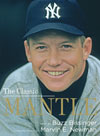 Buzz Bissinger wrote the text for "The Classic Mantle," published by Abrams in October.
Buzz Bissinger wrote the text for "The Classic Mantle," published by Abrams in October.The book tells the story of Mickey Mantle's 18-year career in baseball, all with the New York Yankees, during which he won three MVP awards, seven World Series titles, and was a perennial All Star. Bissinger's narrative is coupled with 50 photographs by Marvin E. Newman.
1994
 Katie King was elected to the University of Washington Department of Communication's Alumni Hall of Fame in October. King, who received a bachelor of arts degree from
Katie King was elected to the University of Washington Department of Communication's Alumni Hall of Fame in October. King, who received a bachelor of arts degree fromthe school in 1983, is currently senior product manager for portal and partnerships for
MSN UK in London, where she has lived since 2008. She also has a degree in Spanish language and literature from the University of Washington. King had previously been a Latin America correspondent and an editor for Reuters.
1999
 Chris Hedges is the writer of "Days of Destruction, Days of Revolt," published by Nation Books in June. A collaboration with cartoonist Joe Sacco, the book is an account of what the pair saw and heard when they visited four "sacrifice zones, those areas in the country that have been offered up for exploitation in the name of profit, progress, and technological advancement"—the poor neighborhoods of Camden, New Jersey; the coal-mining town of Welch, West Virginia; the Indian reservation in Pine Ridge, North Dakota; and migrant labor camps in Immokalee, Florida—to look at the reality of income inequality in the U.S.
Chris Hedges is the writer of "Days of Destruction, Days of Revolt," published by Nation Books in June. A collaboration with cartoonist Joe Sacco, the book is an account of what the pair saw and heard when they visited four "sacrifice zones, those areas in the country that have been offered up for exploitation in the name of profit, progress, and technological advancement"—the poor neighborhoods of Camden, New Jersey; the coal-mining town of Welch, West Virginia; the Indian reservation in Pine Ridge, North Dakota; and migrant labor camps in Immokalee, Florida—to look at the reality of income inequality in the U.S.The reporting, writing and illustrating took two years, and they were nearing completion when the Occupy Wall Street protests began in September 2011. In response, they added a final chapter about the movement. Hedges writes in the introduction: "This revolt rooted our conclusion in the real rather than the speculative. It permitted us to finish with a look at a rebellion that was as concrete as the destruction that led to it. And it permitted us to end our work with the capacity for hope."
Hedges, a columnist at Truthdig and senior fellow at The Nation Institute, spent nearly two decades as a foreign correspondent for The New York Times, NPR and other organizations.
2001
 J.R. Moehringer's first novel, "Sutton," was released in September by Hyperion. A work of historical fiction, the book aims to fill the gaps in the life of bank robber Willie "The Actor" Sutton. Through a narrative that shifts in time—taking off from an actual Christmas Day interview Sutton did following his release from prison in 1969 and moving to his earlier years as a criminal and convict—Moehringer explores the deeper motivations and inspirations of one of America's most successful bank robbers.
J.R. Moehringer's first novel, "Sutton," was released in September by Hyperion. A work of historical fiction, the book aims to fill the gaps in the life of bank robber Willie "The Actor" Sutton. Through a narrative that shifts in time—taking off from an actual Christmas Day interview Sutton did following his release from prison in 1969 and moving to his earlier years as a criminal and convict—Moehringer explores the deeper motivations and inspirations of one of America's most successful bank robbers.In an interview with Publishers Weekly, Moehringer said, "I only became a journalist because I couldn't figure out how to become a novelist. A historical novel seemed a good gateway to fiction—fiction with training wheels."
A former national correspondent for the Los Angeles Times and winner of the 2000 Pulitzer Prize for Feature Writing, Moehringer is also the author
of "The Tender Bar," a memoir.
2002
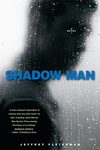 Jeffrey Fleishman's second novel, "Shadow Man," was published in August by Steerforth Press.
Jeffrey Fleishman's second novel, "Shadow Man," was published in August by Steerforth Press.James Ryan is a 52-year-old former foreign correspondent with early-onset Alzheimer's disease. He only remembers the summer after his mother died, when he was 15, and a mysterious woman arrived. A review in Publishers Weekly said, "Vibrant prose and masterful shifts in narrative temporalities make this psychological-noir a must-read."
Fleishman, Cairo bureau chief for the Los Angeles Times, is a longtime foreign correspondent.
2004
 Ju-Don Marshall Roberts was promoted to general manager and senior vice president of EverydayHealth.com in June.
Ju-Don Marshall Roberts was promoted to general manager and senior vice president of EverydayHealth.com in June.Roberts joined the network of health and wellness websites in 2011 as vice president and editor in chief of news and audience development. The new position has her overseeing the editorial operations as well as web, mobile, social, video and product strategies for Every-dayHealth.com.
She spent 17 years at The Washington Post Company, most recently as managing editor of washingtonpost.com. 2008
2008
 Andrew Meldrum became the assistant Africa editor for The Associated Press in August. Based out of the AP's regional headquarters in Johannesburg, he is responsible for commissioning and editing stories from correspondents across the continent.
Andrew Meldrum became the assistant Africa editor for The Associated Press in August. Based out of the AP's regional headquarters in Johannesburg, he is responsible for commissioning and editing stories from correspondents across the continent.Meldrum, who had most recently been the deputy managing editor of GlobalPost, spent 23 years reporting in Zimbabwe for The Guardian, The Economist, and other outlets. He was arrested and expelled from the country in 2003 and spent another four years reporting from South Africa.
"It's exciting to be back in Africa covering all the news—the good, the bad, the funny and the tragic, and everything in between," Meldrum wrote in an e-mail. "In particular, it is fascinating to see how South Africa's political situation develops, with Jacob Zuma running for re-election while many blacks complain that their living conditions have not improved since the end of apartheid."
"I am still barred from re-entering Zimbabwe," he added, "but when the situation improves in Zimbabwe I intend to press a court case to have that ban lifted."
2009
 Kael Alford received the New Orleans Photo Alliance's 2012 Michael P. Smith Fund for Documentary Photography grant for her project "Bottom of da Boot: Losing the Coast of Louisiana."
Kael Alford received the New Orleans Photo Alliance's 2012 Michael P. Smith Fund for Documentary Photography grant for her project "Bottom of da Boot: Losing the Coast of Louisiana."Her photos, commissioned by the High Museum of Art in Atlanta, look at the effects of erosion on the culture and landscape of coastal Louisiana. The fund awards $5,000 annually to a Gulf Coast photographer "whose work combines artistic excellence and a sustained commitment to a long-term cultural documentary project," according the alliance's website.
*
 Margie Mason has been named Indonesia bureau chief for The Associated Press. "Indonesia is one of Asia's and the world's most important countries, and Mason is an exacting journalist with deep interest in the issues facing its 240 million people," said John Daniszewski, the AP's senior managing editor for international news.
Margie Mason has been named Indonesia bureau chief for The Associated Press. "Indonesia is one of Asia's and the world's most important countries, and Mason is an exacting journalist with deep interest in the issues facing its 240 million people," said John Daniszewski, the AP's senior managing editor for international news.Since 2003, Mason had been based in Hanoi, Vietnam, running the AP's Asia-Pacific medical beat, which she will continue to lead from her new post in Jakarta. In addition, she'll cover terrorism, environmental issues, and economic stories.
In an e-mail, she wrote, "I plan to report and write from many places across the country, but I will also supervise other reporters as well as overseeing the daily report from Indonesia."
2010
 Audra Ang's memoir "To the People, Food Is Heaven" was published in October by Lyons Press.
Audra Ang's memoir "To the People, Food Is Heaven" was published in October by Lyons Press.In it, Ang draws on seven years of reporting across China for The Associated Press, examining the lives and diets of ordinary people in a country where many struggle to keep their families fed. Through food, she delves into major stories such as earthquakes and military crackdowns in Tibet.
Ang spent 15 years as a reporter and editor for the AP in Seattle, New York, and Beijing. She is currently a senior development writer at Duke University in Durham, North Carolina.

